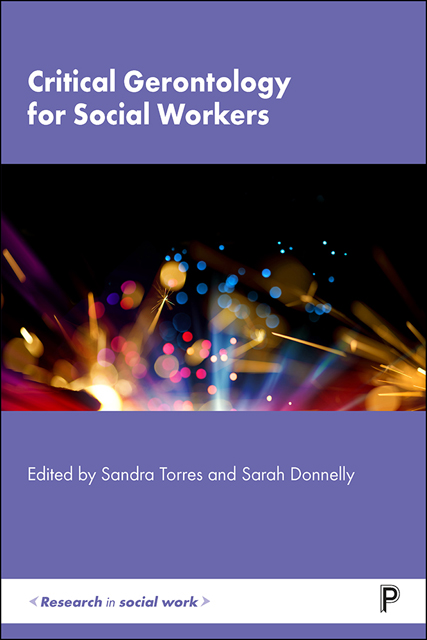Book contents
- Frontmatter
- Contents
- List of figures and tables
- Notes on contributors
- Acknowledgements
- Preface
- 1 Social work and critical gerontology: why the former needs the latter
- Part I Critical gerontology as guiding principles for social work with older people
- Part II Applying the critical gerontological lens to social work research, policy and practice
- Index
1 - Social work and critical gerontology: why the former needs the latter
Published online by Cambridge University Press: 13 October 2022
- Frontmatter
- Contents
- List of figures and tables
- Notes on contributors
- Acknowledgements
- Preface
- 1 Social work and critical gerontology: why the former needs the latter
- Part I Critical gerontology as guiding principles for social work with older people
- Part II Applying the critical gerontological lens to social work research, policy and practice
- Index
Summary
A global transformation is taking place as the world's population is rapidly ageing and, for the first time in history, most people can expect to live into their 60s and beyond. It is therefore understandable that one of the latest reports written by the Population Division of the United Nations’ Department of Economic and Social Affairs begins with the following statement:
According to World Population Prospects 2019 (United Nations, 2019), by 2050, 1 in 6 people in the world will be over the age of 65, up from 1 in 11 in 2019. All societies in the world are in the midst of this longevity revolution – some are at its early stages and some are more advanced. But all will pass through this extraordinary transition, in which the chance of surviving to age 65 rises from less than 50 per cent – as was the case in Sweden in the 1890s – to more than 90 per cent at present in countries with the highest life expectancy. What is more, the proportion of adult life spent beyond age 65 increased from less than a fifth in the 1960s to a quarter or more in most developed countries today. (United Nations 2019, p iii)
While the demographic shift that we call population ageing started in highincome countries, low-and middle-income countries are experiencing the greatest change now (WHO, 2015). As a demographic transition, population ageing is of interest and concern to scholars, policy makers and practitioners in an array of spheres, since the rapid ageing of populations around the world means that health, labour supply and economic growth-related challenges will arise. This is why population ageing, and the globalisation of international migration, are societal trends that all of us who are involved in gerontological research, policy and practice must reckon with (Lawrence and Torres, 2016; Torres, 2019). Both trends are, of course, cause for celebration, since the fact that more of us are living to reach advanced old age is an achievement for humankind, and increased diversity can expand our imagination in more ways than we can imagine. An array of challenges are, however, posed by these trends, since they affect not only societies and the welfare systems we rely on to provide us with help in difficult times but also the social work profession in particular.
- Type
- Chapter
- Information
- Critical Gerontology for Social Workers , pp. 1 - 16Publisher: Bristol University PressPrint publication year: 2022



